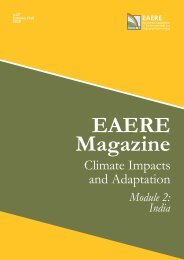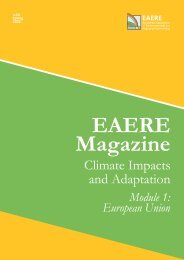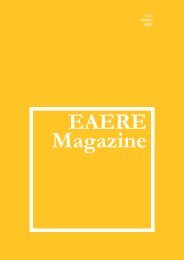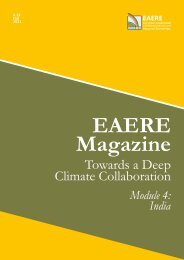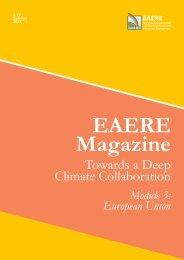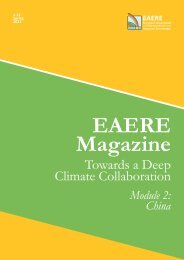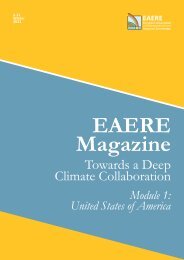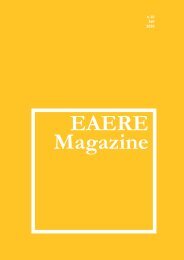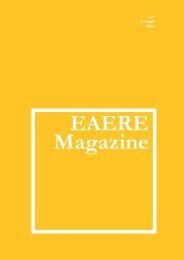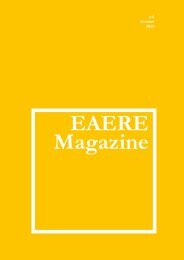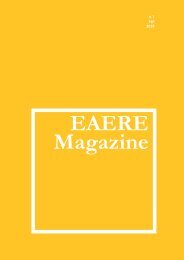EAERE Magazine - n.8 Winter 2020
Create successful ePaper yourself
Turn your PDF publications into a flip-book with our unique Google optimized e-Paper software.
tion gap, we therefore wondered<br />
whether members of the (German)<br />
public know what they know and<br />
don’t know about climate change.<br />
To address this question we (Fischer,<br />
Amelung & Said, 2019) asked a national<br />
sample of German citizens to verify<br />
eight statements about the causes of<br />
climate change, its current state, and its<br />
consequences. The eight statements were:<br />
• The global average temperature in the<br />
air has increased approx. 3.1 °C in the<br />
past 100 years. (False)<br />
• The 1990s was the warmest decade<br />
during the past 100 years. (False)<br />
• The global change in temperature in<br />
the past 100 years is the largest during the<br />
past 1,000 years. (True)<br />
• Climate change is mainly caused by a<br />
natural variation in sunbeam and volcanic<br />
eruption. (False)<br />
• Carbon dioxide concentration in the<br />
atmosphere has increased more than<br />
30% during the past 250 years. (True)<br />
• The increase of greenhouse gases<br />
is mainly caused by human activities.<br />
(True)<br />
• The blanket of snow in the Northern<br />
Hemisphere has decreased approximately<br />
10% since the 1960s. (True)<br />
• An increasing amount of greenhouse<br />
gases increases the risk of<br />
more UV-radiation and therefore<br />
a larger risk of skin cancer. (False)<br />
For each of these statements, citizens indicated<br />
whether it was true or false. Importantly,<br />
to assess not only knowledge,<br />
but also meta-knowledge, citizens indicated,<br />
after each verification: “How certain<br />
are you that your answer is correct?”.<br />
Are German citizens’ confidence judgments<br />
trustworthy indicators of their<br />
actual climate change knowledge? For true<br />
statements this appeared to be the case:<br />
Even though there were statements for<br />
which citizens were mildly under- or overconfident,<br />
our results showed that citizens<br />
were well-calibrated overall. That is, for<br />
true statements, citizens could reliably indicate<br />
what they know about climate change<br />
For the false statements, however, the<br />
results revealed a radically different picture:<br />
citizens appeared to have no insight into<br />
their lack of knowledge. Specifically, citizens<br />
vastly overestimated their ability<br />
to recognize false statements as false.<br />
To put these results into context, we compared<br />
meta-knowledge of climate change<br />
in the German population with (1) meta-knowledge<br />
in general science (e.g.,<br />
“Lasers work by focusing sound waves”<br />
or “Antibiotics kill viruses as well as bacteria”)<br />
in another national German sample;<br />
and with (2) meta-knowledge of climate<br />
change in a sample of over two hundred<br />
scientists working in climate science.<br />
These comparative results showed that<br />
German citizens’ confidence was particularly<br />
poorly aligned with the accuracy of<br />
their climate change knowledge compared<br />
to both (1) their knowledge of general<br />
science, and (2) compared to scientists. Importantly,<br />
these differences were not due<br />
to differences in knowledge, but held also<br />
when controlling for knowledge. Moreover,<br />
even when compared to their own<br />
climate change knowledge, German<br />
citizens’ confidence was less calibrated<br />
than it could be, showing that citizens<br />
were unnecessarily confused about their<br />
own knowledge of climate change.<br />
Relevance and Implications<br />
We found a lack of insight into climate<br />
change knowledge in the German population<br />
which is relevant for at least three reasons.<br />
First, given prior research demonstrating<br />
the importance of well-calibrated confidence<br />
for optimal decision-making (Hadar<br />
& Sood, 2014; Meyer, Payne, Meeks, Rao,<br />
& Singh, 2013), our results are worrying.<br />
Citizens could hardly tell when statements<br />
about climate change were false, and this<br />
was the case even when they were sure they<br />
were right. This is all the more troublesome<br />
given that not only own confidence, but<br />
also other’s confidence can be decision-relevant:<br />
All else being equal, citizens tend to<br />
rely more on more confident informants<br />
(Tenney, Spellman, & MacCoun, 2008).<br />
Our results hence suggest that citizens<br />
21



